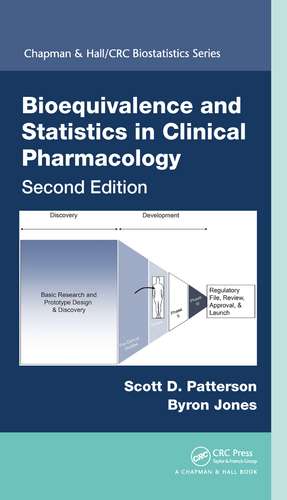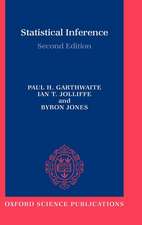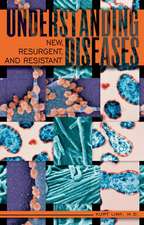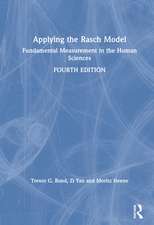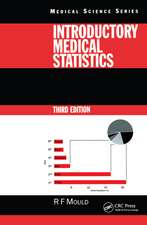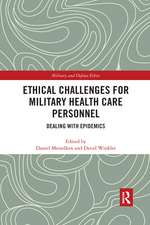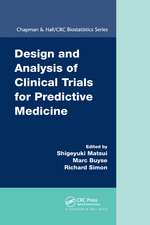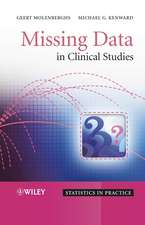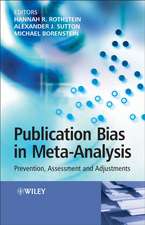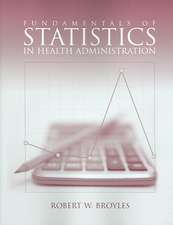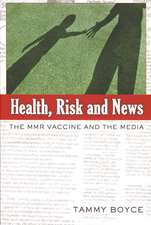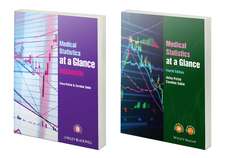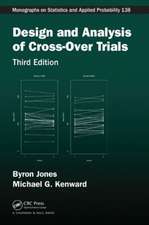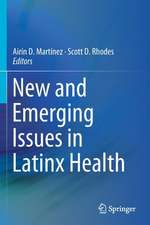Bioequivalence and Statistics in Clinical Pharmacology: Chapman & Hall/CRC Biostatistics Series
Autor Scott D. Patterson, Byron Jonesen Limba Engleză Paperback – 31 mar 2021
Drawing on knowledge gained directly from working in the pharmaceutical industry, the authors set the stage by describing the general role of statistics. Once the foundation of clinical pharmacology drug development, regulatory applications, and the design and analysis of bioequivalence trials are established, including recent regulatory changes in design and analysis and in particular sample-size adaptation, they move on to related topics in clinical pharmacology involving the use of cross-over designs. These include, but are not limited to, safety studies in Phase I, dose-response trials, drug interaction trials, food-effect and combination trials, QTc and other pharmacodynamic equivalence trials, proof-of-concept trials, dose-proportionality trials, and vaccines trials.
This second edition addresses several recent developments in the field, including new chapters on adaptive bioequivalence studies, scaled average bioequivalence testing, and vaccine trials.
Purposefully designed to be instantly applicable, Bioequivalence and Statistics in Clinical Pharmacology, Second Edition provides examples of SAS and R code so that the analyses described can be immediately implemented. The authors have made extensive use of the proc mixed procedures available in SAS.
Din seria Chapman & Hall/CRC Biostatistics Series
-
 Preț: 386.62 lei
Preț: 386.62 lei -
 Preț: 355.91 lei
Preț: 355.91 lei - 8%
 Preț: 531.50 lei
Preț: 531.50 lei -
 Preț: 341.42 lei
Preț: 341.42 lei -
 Preț: 354.48 lei
Preț: 354.48 lei - 5%
 Preț: 656.94 lei
Preț: 656.94 lei -
 Preț: 342.89 lei
Preț: 342.89 lei -
 Preț: 288.80 lei
Preț: 288.80 lei -
 Preț: 312.36 lei
Preț: 312.36 lei - 9%
 Preț: 644.57 lei
Preț: 644.57 lei - 9%
 Preț: 608.32 lei
Preț: 608.32 lei -
 Preț: 356.63 lei
Preț: 356.63 lei -
 Preț: 354.77 lei
Preț: 354.77 lei - 8%
 Preț: 376.64 lei
Preț: 376.64 lei -
 Preț: 372.30 lei
Preț: 372.30 lei - 8%
 Preț: 418.23 lei
Preț: 418.23 lei - 9%
 Preț: 766.27 lei
Preț: 766.27 lei -
 Preț: 378.11 lei
Preț: 378.11 lei -
 Preț: 356.63 lei
Preț: 356.63 lei - 9%
 Preț: 682.93 lei
Preț: 682.93 lei - 9%
 Preț: 594.78 lei
Preț: 594.78 lei -
 Preț: 311.41 lei
Preț: 311.41 lei - 9%
 Preț: 683.11 lei
Preț: 683.11 lei - 9%
 Preț: 833.28 lei
Preț: 833.28 lei - 9%
 Preț: 681.82 lei
Preț: 681.82 lei -
 Preț: 362.00 lei
Preț: 362.00 lei - 9%
 Preț: 940.38 lei
Preț: 940.38 lei - 18%
 Preț: 791.14 lei
Preț: 791.14 lei - 18%
 Preț: 702.37 lei
Preț: 702.37 lei - 18%
 Preț: 1730.31 lei
Preț: 1730.31 lei - 26%
 Preț: 875.13 lei
Preț: 875.13 lei - 18%
 Preț: 786.89 lei
Preț: 786.89 lei - 25%
 Preț: 825.63 lei
Preț: 825.63 lei - 15%
 Preț: 678.14 lei
Preț: 678.14 lei - 25%
 Preț: 557.58 lei
Preț: 557.58 lei - 25%
 Preț: 625.83 lei
Preț: 625.83 lei - 18%
 Preț: 786.38 lei
Preț: 786.38 lei - 25%
 Preț: 778.07 lei
Preț: 778.07 lei - 25%
 Preț: 628.29 lei
Preț: 628.29 lei - 18%
 Preț: 1124.97 lei
Preț: 1124.97 lei - 25%
 Preț: 887.55 lei
Preț: 887.55 lei - 25%
 Preț: 526.81 lei
Preț: 526.81 lei - 25%
 Preț: 560.34 lei
Preț: 560.34 lei - 15%
 Preț: 479.86 lei
Preț: 479.86 lei - 18%
 Preț: 1017.63 lei
Preț: 1017.63 lei - 18%
 Preț: 1115.51 lei
Preț: 1115.51 lei
Preț: 436.14 lei
Nou
Puncte Express: 654
Preț estimativ în valută:
83.46€ • 86.64$ • 69.60£
83.46€ • 86.64$ • 69.60£
Carte tipărită la comandă
Livrare economică 24 martie-07 aprilie
Preluare comenzi: 021 569.72.76
Specificații
ISBN-13: 9780367782443
ISBN-10: 0367782448
Pagini: 460
Dimensiuni: 178 x 254 x 24 mm
Greutate: 0.45 kg
Ediția:Nouă
Editura: CRC Press
Colecția Chapman and Hall/CRC
Seria Chapman & Hall/CRC Biostatistics Series
Locul publicării:Boca Raton, United States
ISBN-10: 0367782448
Pagini: 460
Dimensiuni: 178 x 254 x 24 mm
Greutate: 0.45 kg
Ediția:Nouă
Editura: CRC Press
Colecția Chapman and Hall/CRC
Seria Chapman & Hall/CRC Biostatistics Series
Locul publicării:Boca Raton, United States
Public țintă
Professional Practice & DevelopmentCuprins
Bioequivalence & Biopharmaceutical Development
Drug Development and Clinical Pharmacology
Aims of This Book
Biopharmaceutical Development
Clinical Pharmacology
Statistics in Clinical Pharmacology
Structure of the Book
History and Regulation of Bioequivalence
When and How BE Studies Are Performed
Why Are BE Studies Performed?
Deciding When Formulations Are Bioequivalent
Potential Issues with TOST Bioequivalent
Current International Regulation
Some Practical Notes
Testing for Average Bioequivalence
Background
Linear Model for 2 x 2 Data
Applying the TOST Procedure
Carry-over, Sequence, and Interaction Effects
Checking Assumptions Made about the Linear Model
Power and Sample Size for ABE in the 2 x 2 Design
Example Where Test and Reference Are Not ABE
Nonparametric Analysis
BE Studies with More Than Two Periods
Background
Three-period Designs
Within-subject Variability
Robust Analyses for Three Period Designs
Four-period Designs
Designes with More Than Two Treatments
Adjusting for Multiple Testing
Nonparametric Analyses of Tmax
Technical appendix: Efficiency
Tables of Data
Special Topics in Bioequivalence
Dealing with Special BE Challenges
Restricted Maximum Likelihood Modelling
Failing BE and the DER Assessment
Simulation
Data-based Simulation
Carry-over
Optimal Designs
Determining Trial Size
What Outliers Are and How to Handle Their Data
Bayesian BE Assessment
Adaptive Bioequivalence Trials
Background
Two-stage design for testing for ABE
TOST using the standard combination test
Example of using the standard combination test
The maximum combination test
Example of using the maximum combination test
Conditional errors and conditional power
Algorithm for sample size re-estimation
Operating characteristics
Conclusions
Techniccal Appendix: R code
Scaled Average Bioequivalence Testing
Background
Scaled Average Bioequivalence in Europe
Scaled Average Bioequivalence in USA
Discussion and Cautions
Clinical Pharmacology
Clinical Pharmacology Safety Studies
Background
First-time-in-humans
Sub-chronic Dosing Studies
Food-Effect Assessment and DDIs
Dose-Proportionality
Technical Appendix
QTc
Background
Modelling of QTc Data
Interpreting the QTc Modelling Findings
Design of a Thorough QTc Study in the Future
Clinical Pharmacology Efficacy Studies
Background
Sub-chronic Dosing
Phase IIa and the Proof of Concept
Population Pharmacokinetics
Population and Pharmacokinetics
Absolute and Relative Bioavailabili
Drug Development and Clinical Pharmacology
Aims of This Book
Biopharmaceutical Development
Clinical Pharmacology
Statistics in Clinical Pharmacology
Structure of the Book
History and Regulation of Bioequivalence
When and How BE Studies Are Performed
Why Are BE Studies Performed?
Deciding When Formulations Are Bioequivalent
Potential Issues with TOST Bioequivalent
Current International Regulation
Some Practical Notes
Testing for Average Bioequivalence
Background
Linear Model for 2 x 2 Data
Applying the TOST Procedure
Carry-over, Sequence, and Interaction Effects
Checking Assumptions Made about the Linear Model
Power and Sample Size for ABE in the 2 x 2 Design
Example Where Test and Reference Are Not ABE
Nonparametric Analysis
BE Studies with More Than Two Periods
Background
Three-period Designs
Within-subject Variability
Robust Analyses for Three Period Designs
Four-period Designs
Designes with More Than Two Treatments
Adjusting for Multiple Testing
Nonparametric Analyses of Tmax
Technical appendix: Efficiency
Tables of Data
Special Topics in Bioequivalence
Dealing with Special BE Challenges
Restricted Maximum Likelihood Modelling
Failing BE and the DER Assessment
Simulation
Data-based Simulation
Carry-over
Optimal Designs
Determining Trial Size
What Outliers Are and How to Handle Their Data
Bayesian BE Assessment
Adaptive Bioequivalence Trials
Background
Two-stage design for testing for ABE
TOST using the standard combination test
Example of using the standard combination test
The maximum combination test
Example of using the maximum combination test
Conditional errors and conditional power
Algorithm for sample size re-estimation
Operating characteristics
Conclusions
Techniccal Appendix: R code
Scaled Average Bioequivalence Testing
Background
Scaled Average Bioequivalence in Europe
Scaled Average Bioequivalence in USA
Discussion and Cautions
Clinical Pharmacology
Clinical Pharmacology Safety Studies
Background
First-time-in-humans
Sub-chronic Dosing Studies
Food-Effect Assessment and DDIs
Dose-Proportionality
Technical Appendix
QTc
Background
Modelling of QTc Data
Interpreting the QTc Modelling Findings
Design of a Thorough QTc Study in the Future
Clinical Pharmacology Efficacy Studies
Background
Sub-chronic Dosing
Phase IIa and the Proof of Concept
Population Pharmacokinetics
Population and Pharmacokinetics
Absolute and Relative Bioavailabili
Recenzii
"The two authors are well-respected statisticians with numerous publications in BE and broad pharmaceutical industry experience. … The book is written in plain language and statistics is presented with minimum mathematical proof, which makes it a great introduction and reference for statisticians and clinical pharmacologists. With case studies and associated SAS and R codes included in the book and website, both statisticians and clinical pharmacologists will find this book helpful in understanding the context to use a method and implementing the ready-to-use codes. Particularly, each chapter begins with an interesting real-life story of the authors working as statisticians in the pharmaceutical industry, which makes the reading delightful. …In summary, Bioequivalence and Statistics in Clinical Pharmacology, Second Edition, provides an update on regulatory recommendations, statistical methods, and applications in clinical pharmacology and BE studies to support drug product development. With its inclusion of SAS and R codes, this book will be a valuable reference for pharmaceutical scientists, statisticians, and regulators working in these areas."
—Wangjie Sun and Wenlei Jiang, US Food and Drug Administration, in Journal of the American Statistical Association, January 2018
"This book is a second edition of the authors’ take on the concepts and methods in the analysis and design of bioequivalence studies, supported by references to regulation authorities’ guidelines ... The authors are working in the pharmaceutical industry and therefore bring a view from the inside compared to the other reference work in the field by academics … Throughout the book, different examples with data and codes are provided both showing and not showing bioequivalence to facilitate the learning process. … To conclude, this book covers efficiently the statistical methods of bioequivalence testing and their many applications in clinical pharmacology. Furthermore, the dense reference list provides a helpful guide for the reader to go in deeper details on topics of interest."
—Julie Bertrand, Faculté de Médecine Bichat, IAME, in Journal of Biopharmaceutical Statistics, May 2017
"The first edition of Bioequivalence and Statistics in Clinical Pharmacology was a classic text book for researchers and statisticians in the field of clinical pharmacology and pharmaceutical industry. This new second edition is a timely update with the inclusion of new areas such as adaptive bioequivalence trials, scaled average bioequivalence testing, and vaccine trials. This is one of few books in the literature with the focus on statistical issues in clinical pharmacology and bioequivalence. The topics it covers are critical for understanding the pharmacology of an investigational drug, and are becoming increasingly important in the era of precision medicine. The book is just as well structured as the first edition, in an accessible, thorough, and clear manner. Case studies and associated SAS code included in the book are extremely helpful. In summary, the book is a most welcome addition to the collection of pharmaceutic statisticians and researchers in clinical pharmacology."
—Liang Fang, Director of Biostatistics, Gilead Sciences Inc.
"Bioequivalence and Statistics in Clinical Pharmacology, Second Edition, provides readers with a statistical background of bioequivalence and presents several special topics in clinical pharmacology. This second edition contains updated and extended discussions of these topics and includes new chapters on adaptive bioequivalence studies, scaled average bioequivalence, and vaccine trials. The book’s presentation is comprehensive and clear, and is complimented by numerous illustrations, examples, and computer programs with data analyses. Scientists and practitioners working in industry, regulatory authorities, and academia will find this book useful, interesting, and enjoyable due to the delightful and instructive stories featured in the introductions of each chapter, the various important and relevant topics covered by these chapters, and the informative and practical technical appendices."
—Laszlo Endrenyi, Professor Emeritus, University of Toronto
Praise for the First Edition:
"… the book provides a good introduction to common uses of statistics in early phases of the drug development process by using a good mix of technical detail, intuitive understanding and factual knowledge. … personal accounts together with the numerous real data examples which are accompanied by SAS code for analysis and the opportunity to download the data to gain first-hand experience are the best features of the book. … the authors did a fine job in providing an introduction to statistics in the early stages of the drug development process. The availability of real example data allows the reader to engage himself easily in the topic and the long experience of the authors ensures that many different aspects of pharmacological studies are discussed."
—Thomas Jaki, Lancaster University, Journal of the Royal Statistical Society, Series A, 2010
"I really enjoyed reading this book. Each chapter includes an excellent introduction based on Scott Patterson's experience working as a biometrician. This will especially be of interest to young statisticians starting their career in the pharmaceutical industry. Therefore, I strongly recommend this book to all pharmaceutical statisticians to learn more of the challenging statistical problems being generated in drug development. In addition, the presented material provides a springboard for all scientists from academia who are looking to do research in this area of medical applications."
—Dieter Haushcke, Biometrics, September, 2006
"The authors formulate bioequivalence exhaustively and clearly. … Given the background of the authors, they constitute a key piece of social information in understanding the context in which clinical pharmacology research develops within the pharmaceutical industry."
—Journal of Biopharmaceutical Statistics
—Wangjie Sun and Wenlei Jiang, US Food and Drug Administration, in Journal of the American Statistical Association, January 2018
"This book is a second edition of the authors’ take on the concepts and methods in the analysis and design of bioequivalence studies, supported by references to regulation authorities’ guidelines ... The authors are working in the pharmaceutical industry and therefore bring a view from the inside compared to the other reference work in the field by academics … Throughout the book, different examples with data and codes are provided both showing and not showing bioequivalence to facilitate the learning process. … To conclude, this book covers efficiently the statistical methods of bioequivalence testing and their many applications in clinical pharmacology. Furthermore, the dense reference list provides a helpful guide for the reader to go in deeper details on topics of interest."
—Julie Bertrand, Faculté de Médecine Bichat, IAME, in Journal of Biopharmaceutical Statistics, May 2017
"The first edition of Bioequivalence and Statistics in Clinical Pharmacology was a classic text book for researchers and statisticians in the field of clinical pharmacology and pharmaceutical industry. This new second edition is a timely update with the inclusion of new areas such as adaptive bioequivalence trials, scaled average bioequivalence testing, and vaccine trials. This is one of few books in the literature with the focus on statistical issues in clinical pharmacology and bioequivalence. The topics it covers are critical for understanding the pharmacology of an investigational drug, and are becoming increasingly important in the era of precision medicine. The book is just as well structured as the first edition, in an accessible, thorough, and clear manner. Case studies and associated SAS code included in the book are extremely helpful. In summary, the book is a most welcome addition to the collection of pharmaceutic statisticians and researchers in clinical pharmacology."
—Liang Fang, Director of Biostatistics, Gilead Sciences Inc.
"Bioequivalence and Statistics in Clinical Pharmacology, Second Edition, provides readers with a statistical background of bioequivalence and presents several special topics in clinical pharmacology. This second edition contains updated and extended discussions of these topics and includes new chapters on adaptive bioequivalence studies, scaled average bioequivalence, and vaccine trials. The book’s presentation is comprehensive and clear, and is complimented by numerous illustrations, examples, and computer programs with data analyses. Scientists and practitioners working in industry, regulatory authorities, and academia will find this book useful, interesting, and enjoyable due to the delightful and instructive stories featured in the introductions of each chapter, the various important and relevant topics covered by these chapters, and the informative and practical technical appendices."
—Laszlo Endrenyi, Professor Emeritus, University of Toronto
Praise for the First Edition:
"… the book provides a good introduction to common uses of statistics in early phases of the drug development process by using a good mix of technical detail, intuitive understanding and factual knowledge. … personal accounts together with the numerous real data examples which are accompanied by SAS code for analysis and the opportunity to download the data to gain first-hand experience are the best features of the book. … the authors did a fine job in providing an introduction to statistics in the early stages of the drug development process. The availability of real example data allows the reader to engage himself easily in the topic and the long experience of the authors ensures that many different aspects of pharmacological studies are discussed."
—Thomas Jaki, Lancaster University, Journal of the Royal Statistical Society, Series A, 2010
"I really enjoyed reading this book. Each chapter includes an excellent introduction based on Scott Patterson's experience working as a biometrician. This will especially be of interest to young statisticians starting their career in the pharmaceutical industry. Therefore, I strongly recommend this book to all pharmaceutical statisticians to learn more of the challenging statistical problems being generated in drug development. In addition, the presented material provides a springboard for all scientists from academia who are looking to do research in this area of medical applications."
—Dieter Haushcke, Biometrics, September, 2006
"The authors formulate bioequivalence exhaustively and clearly. … Given the background of the authors, they constitute a key piece of social information in understanding the context in which clinical pharmacology research develops within the pharmaceutical industry."
—Journal of Biopharmaceutical Statistics
Notă biografică
Scott D. Patterson, Byron Jones
Descriere
Maintaining a practical perspective, Bioequivalence and Statistics in Clinical Pharmacology, Second Edition explores statistics used in day-to-day clinical pharmacology work. The book is a starting point for those involved in such research and covers the methods needed to design, analyze, and interpret bioequivalence trials; explor
